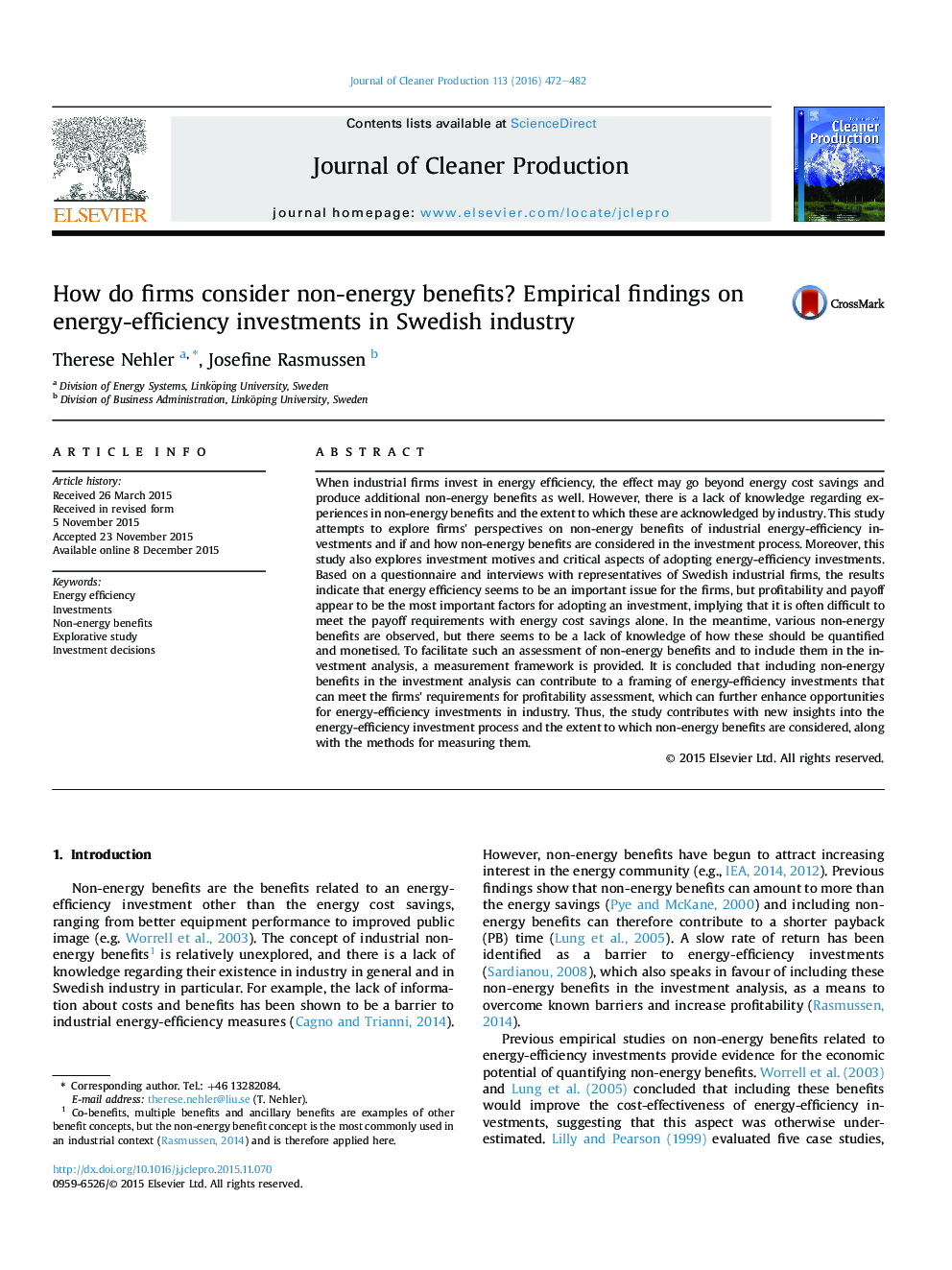| کد مقاله | کد نشریه | سال انتشار | مقاله انگلیسی | نسخه تمام متن |
|---|---|---|---|---|
| 8102916 | 1522136 | 2016 | 11 صفحه PDF | دانلود رایگان |
عنوان انگلیسی مقاله ISI
How do firms consider non-energy benefits? Empirical findings on energy-efficiency investments in Swedish industry
ترجمه فارسی عنوان
شرکت ها چگونه مزایای غیر انرژی را در نظر می گیرند؟ یافته های تجربی در زمینه سرمایه گذاری در زمینه انرژی در صنعت سوئد
دانلود مقاله + سفارش ترجمه
دانلود مقاله ISI انگلیسی
رایگان برای ایرانیان
کلمات کلیدی
بهره وری انرژی، سرمایه گذاری، مزایای غیر انرژی مطالعه اکتشافی، تصمیمات سرمایه گذاری،
ترجمه چکیده
هنگامی که شرکت های صنعتی در بهره وری انرژی سرمایه گذاری می کنند، این اثر ممکن است فراتر از صرفه جویی در هزینه های انرژی باشد و همچنین مزایای غیر انرژی غیرمستقیم. با این حال، کمبود دانش در مورد تجربیات در مزایای غیر انرژی و میزان که توسط صنعت تایید شده است وجود دارد. این مطالعه تلاش می کند تا دیدگاه های شرکت ها را در مورد مزایای غیر انرژی در سرمایه گذاری های صنعتی بهره وری انرژی و درک اینکه چگونه مزایای غیر انرژی در روند سرمایه گذاری در نظر گرفته می شود، مورد بررسی قرار می دهد. علاوه بر این، این مطالعه همچنین به بررسی انگیزه های سرمایه گذاری و جنبه های مهم پذیرش سرمایه گذاری در زمینه بهره وری انرژی می پردازد. بر اساس پرسشنامه و مصاحبه با نمایندگان شرکت های صنعتی سوئد، نتایج نشان می دهد که بهره وری انرژی به نظر می رسد یک مسئله مهم برای شرکت ها است، اما سودآوری و بازپرداخت به نظر می رسد مهم ترین عوامل برای پذیرش سرمایه گذاری است که این امر اغلب صرفه جویی در هزینه صرفه جویی در انرژی صرفه جویی در مصرف برق سخت است. در عین حال، مزایای غیر انرژیی مختلف مشاهده می شود، اما به نظر می رسد کمبود دانش در مورد چگونگی اندازه گیری آن ها و پول نقد وجود دارد. برای تسهیل چنین ارزیابی مزایای غیر انرژی و شامل آنها در تجزیه و تحلیل سرمایه گذاری، یک چارچوب اندازه گیری ارائه شده است. نتیجه گیری می شود که شامل مزایای غیر انرژی در تجزیه و تحلیل سرمایه گذاری می تواند به ساختن سرمایه گذاری های بهره وری انرژی که می تواند نیازهای شرکت ها را برای ارزیابی سودآوری برآورده سازد، کمک می کند که می تواند فرصت های سرمایه گذاری در زمینه انرژی را در صنعت افزایش دهد. بنابراین، مطالعه با درک جدیدی در فرآیند سرمایه گذاری در زمینه بهره وری انرژی و میزان استفاده از مزایای غیر انرژی همراه با روش های اندازه گیری آنها کمک می کند.
موضوعات مرتبط
مهندسی و علوم پایه
مهندسی انرژی
انرژی های تجدید پذیر، توسعه پایدار و محیط زیست
چکیده انگلیسی
When industrial firms invest in energy efficiency, the effect may go beyond energy cost savings and produce additional non-energy benefits as well. However, there is a lack of knowledge regarding experiences in non-energy benefits and the extent to which these are acknowledged by industry. This study attempts to explore firms' perspectives on non-energy benefits of industrial energy-efficiency investments and if and how non-energy benefits are considered in the investment process. Moreover, this study also explores investment motives and critical aspects of adopting energy-efficiency investments. Based on a questionnaire and interviews with representatives of Swedish industrial firms, the results indicate that energy efficiency seems to be an important issue for the firms, but profitability and payoff appear to be the most important factors for adopting an investment, implying that it is often difficult to meet the payoff requirements with energy cost savings alone. In the meantime, various non-energy benefits are observed, but there seems to be a lack of knowledge of how these should be quantified and monetised. To facilitate such an assessment of non-energy benefits and to include them in the investment analysis, a measurement framework is provided. It is concluded that including non-energy benefits in the investment analysis can contribute to a framing of energy-efficiency investments that can meet the firms' requirements for profitability assessment, which can further enhance opportunities for energy-efficiency investments in industry. Thus, the study contributes with new insights into the energy-efficiency investment process and the extent to which non-energy benefits are considered, along with the methods for measuring them.
ناشر
Database: Elsevier - ScienceDirect (ساینس دایرکت)
Journal: Journal of Cleaner Production - Volume 113, 1 February 2016, Pages 472-482
Journal: Journal of Cleaner Production - Volume 113, 1 February 2016, Pages 472-482
نویسندگان
Therese Nehler, Josefine Rasmussen,
